Amazon Unveils Cashier-less Supermarket of the Future — and L.A. Waits in Line
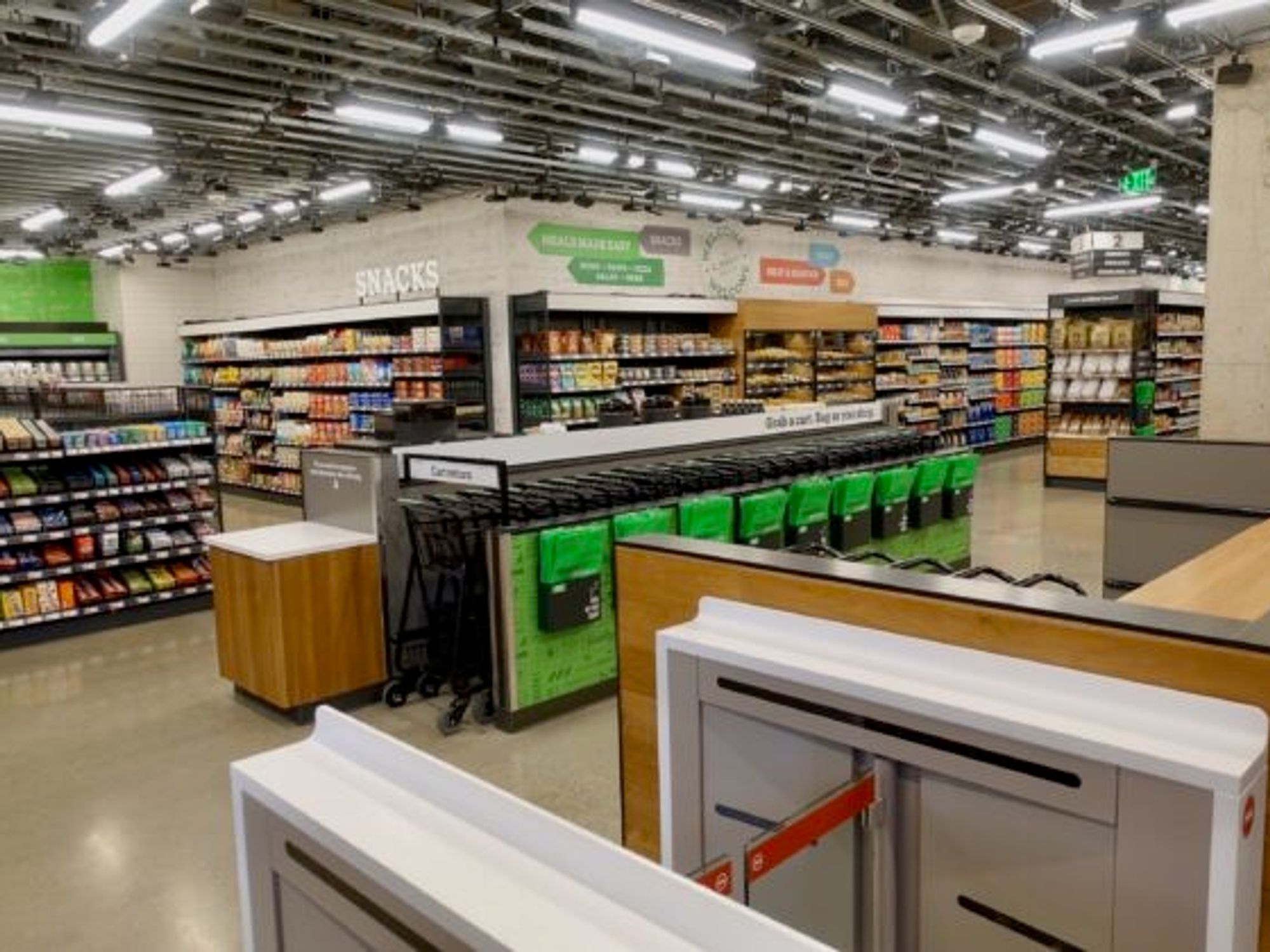
Amazon unveiled its supermarket of the future, a grocery store without cashiers or checkout lines considered a technological breakthrough in the $800 billion industry. Shoppers get to grab-and-go with a full cart of items that are scanned automatically and billed to their bank accounts.
But don't expect to see it anytime soon in Los Angeles.
The surveillance-style experience is a harbinger of things to come as futurists describe the 2.0 of an everyday task: Buying food at a market. There's only one problem. The prototype of a new way to pick up customer's meat, cheese, and dairy is only happening in just one location in Seattle, where Amazon is the city's biggest tech employer.
Amazon has no plans to install the cashless technology at its Whole Foods stores or put it in their conventional grocery set to open in a former 33,000 square foot Toys R' Us in Woodland Hills, according to Jeffries analyst Christopher Mandeville. Amazon would not confirm.
Meanwhile, union officials are gearing up for a fight.
"Amazon has two concepts for its grocery business: bad jobs and no jobs. There's nothing innovative about either one of them," said John Grant, president of the United Food and Commercial Workers International Union Local 770 in an emailed statement. The union represents 47,000 grocery store workers in Southern California. "This is about the richest person on earth seeking new ways to further enrich himself on the backs of workers, communities, and now technology. We will not stand for it."
He may not have to. West Hollywood outlawed cashless stores last year joining a growing list of cities including New York, San Francisco and New Jersey who also prohibit it, saying that it discriminates against low income residents with no bank account. Meanwhile, it's unclear whether consumers will embrace the format.
The Seattle location can be entered by scanning a smartphone app and strolling the aisles of the completely stocked store. The banks of cameras and sensors overhead track everything put into a shopping cart, with the help of artificial intelligence — rendering unnecessary the old-fashioned ritual of scanning and paying at a checkout stand. Items are charged to a shopper's Amazon account shortly after they walk through the exit.

Apart from the larger size, the concept is very similar to the Amazon Go convenience stores that first opened to the public in Seattle in January 2018. Amazon Go has expanded to 25 locations across cities including San Francisco, Chicago and New York. That smaller concept, sized between 450 and 2,700 square feet, ushered in an era of grab-and-go shopping.
"What Amazon Go did for central business districts — like locating it very close to where people work so you can get breakfast, lunch, snacks — Amazon Go Grocery does the same thing, but closer to home," said Dilip Kumar, vice president of Physical Retail & Technology for Amazon. "It's a new format, it's not just a bigger Amazon Go. It's a much more expanded selection that caters to what people are looking for shopping for groceries."
What Amazon is looking for is yet another answer to traditional retail, where it's leveraging convenience and technology in the grocery industry. The tech giant scooped up Whole Foods in 2017 in a bid to take on the sizeable brick-and-mortar footprints of Walmart, Target, Kroger and others. Those companies have consistently responded to Amazon's digital pushes around online grocery ordering and delivery.
Mandeville said in a research note that it's unclear whether it will pencil out, but the new format provides Amazon an opportunity to expand their white label products. "Questions still remain over unit economics and shopper adoption. That said, this is another example that Amazon is forcing the issue - grocers must continue to invest, innovate."
Amazon posted $4.4 billion in revenue last quarter in its physical stores category, which includes Whole Foods and Amazon Go stores.
The Wall Street Journal reported last fall that Amazon had signed leases for more than a dozen locations in Los Angeles with plans to expand the chain. Kumar declined to say how many Amazon Go Grocery stores are coming, where the next one might be, or whether they will all be the same size. Plans for the larger grocery concept in Los Angeles and elsewhere are "something else" entirely, he said, but he likes what they built first in Seattle.
The continued push toward tech and automation has fueled the ongoing debate around human workers being replaced by machines. Amazon Go Grocery will staff just a handful of associates.
Last year under pressure from advocates, Amazon's Go store in New York began accepting cash.
"Consumers aren't demanding this," Grant said. "Its 'cashierless' convenience stores have underperformed comparable stores manned by people."
Hundreds of cameras in the ceiling overhead make up the key technological component of the just-walk-out concept, and they're put to the biggest test in the produce section, where a variety of individually priced fruits and vegetables are available.
"Most of the things at Amazon Go are packaged, or they're single items like a can of Coke," Kumar said. "But here, people are shopping for potatoes or they're shopping for onions — there's a lot more browsing and rummaging that tends to happen. That's what makes this problem a lot more complicated."
The 365 label from Whole Foods identifies the store's organic produce.
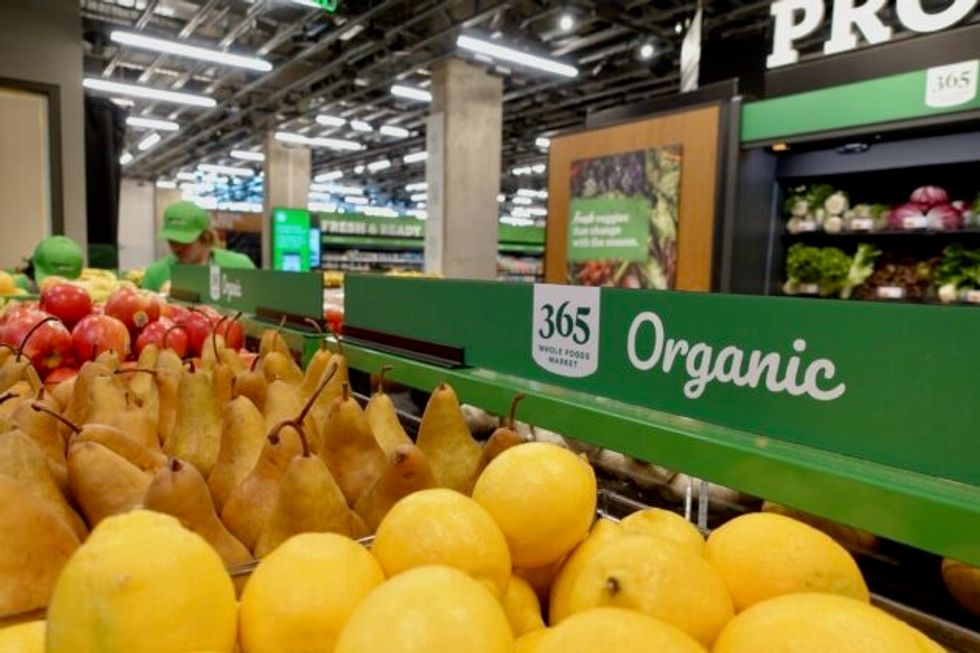
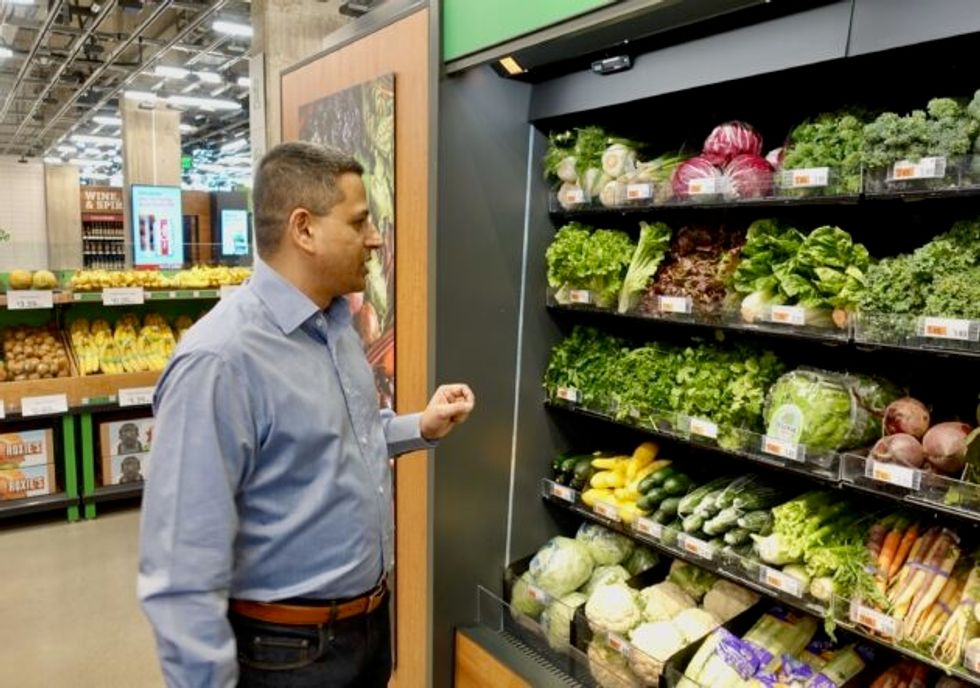
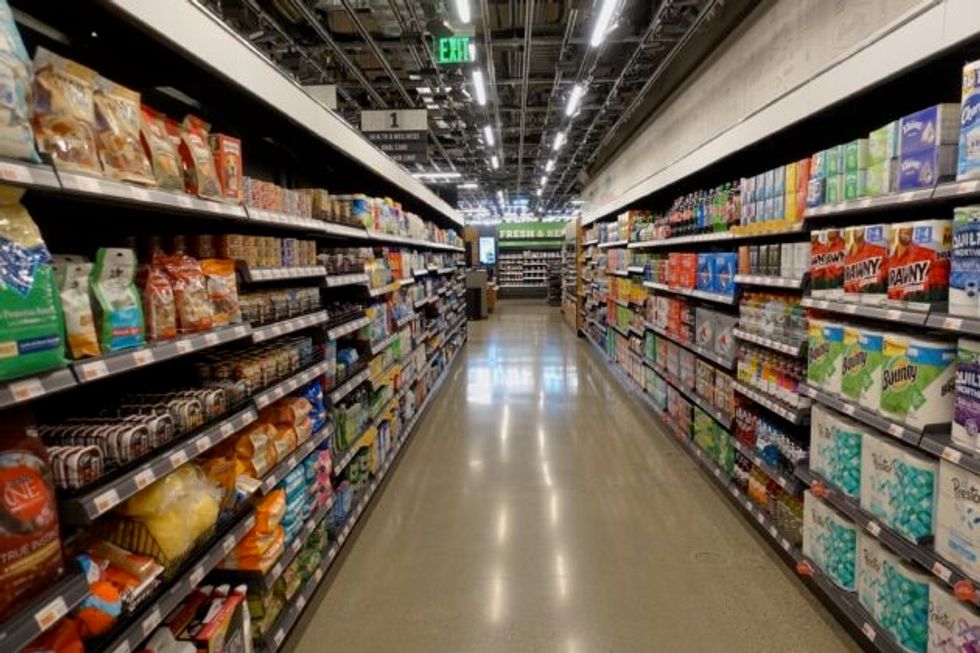
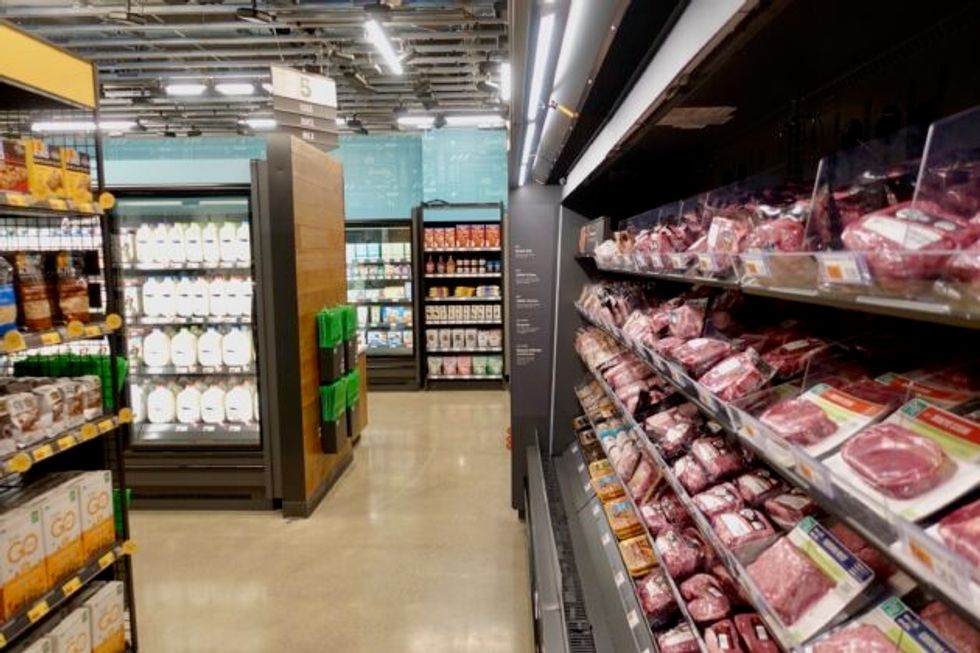
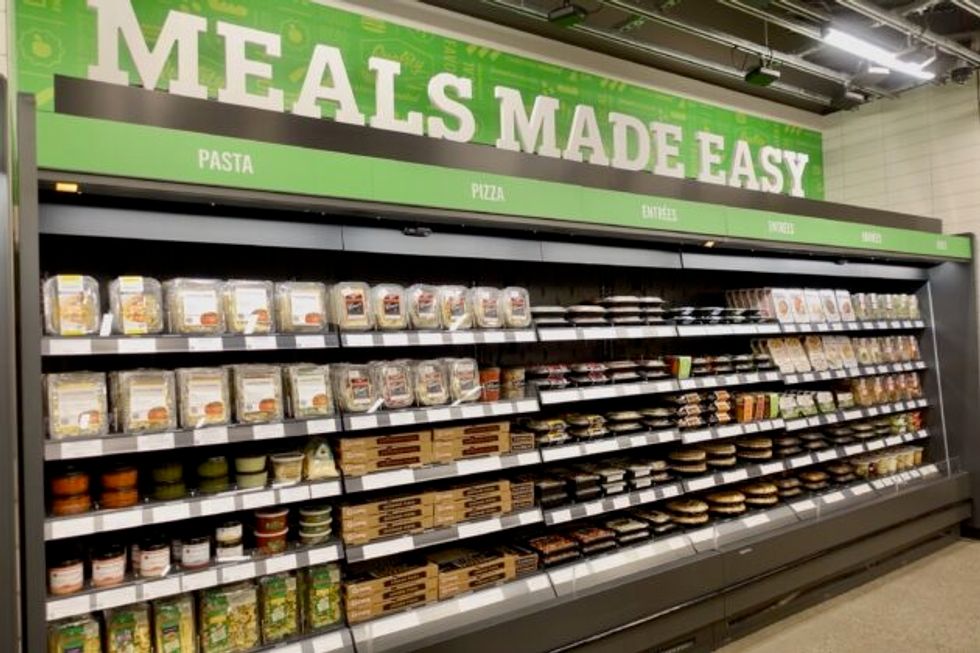
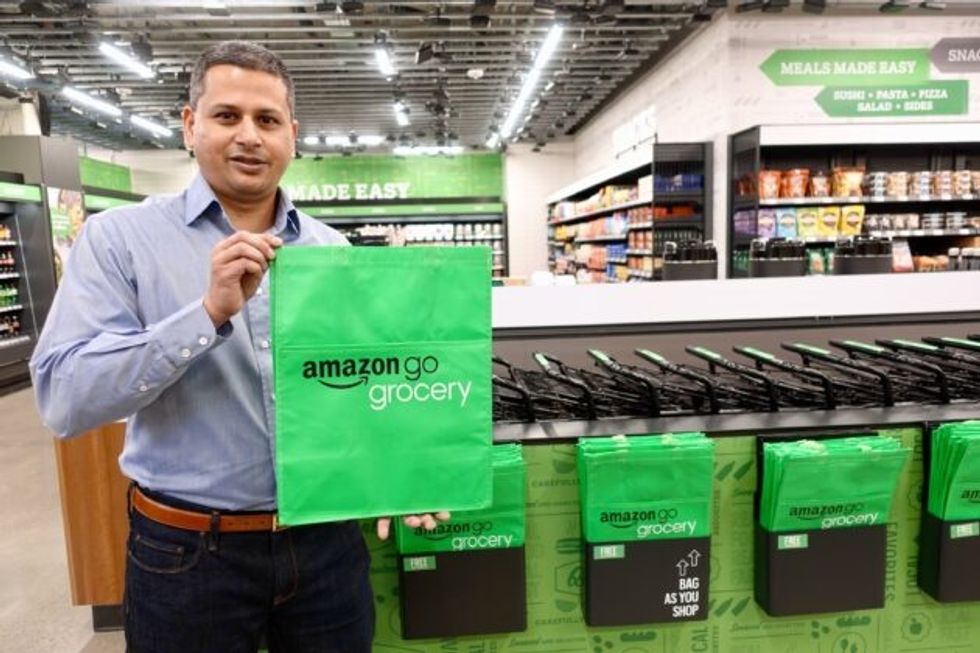
Matt Casey, a retail market analyst who works with supermarket grocery chains said he's not sure the grand experiment will work. "I gotta believe there's gonna be a ton of glitches in the beginning," he said. "But, they are the ones who call the shots, not the public. They create and people react to them, not the other way around. They have deep pockets that will allow them to try this."
Meanwhile, Walmart and Target are stepping up their grocery delivery service and other chains are investing in automation.
Amazon's goal is to generate accurate receipts, no matter how long you stand over the avocados or apples, shifting them around and picking them up before settling on three and then changing your mind to two.
The cameras are keeping track of those "interactions" with the product and know exactly what is being taken off shelves and put back. Allowing people to do this type of "considered shopping" plays into the Go Grocery concept of making sure that customers don't have to do anything unnatural when it comes to how they shop.
"They're used to seeing produce laid out in [a traditional] way," Kumar said, joking about how it's almost necessary, as a shopper, to get spritzed by the misters in the lettuce section.
Kumar called a robust produce section the hallmark of any good grocery store, and Amazon Go Grocery sources its organic produce from the same farms that supply Whole Foods. Its 365 organic label is on prominent display.
Up and down aisles throughout the store — there are 5,000 unique items — national brands are mixed with local favorites that Amazon believes its neighborhood customers would expect the store to stock.
There is no meat or seafood counter and no food preparation on the premises. Fish, chicken and beef products are brought in several times a week, individually wrapped. Signage near cases advises customers on the differences between cuts of meat or wild caught seafood vs. farmed fish. There is also an artisan cheese area where people can get the same sort of quick education via signage rather than from a human cheesemonger.
And it's another indication that Amazon Go Grocery goes beyond Amazon Go.
Back near the front of the store, the quicker grab-and-go nature of what Amazon likes about its Go concept is more readily on display. It's here where the fresh baked goods — donuts, bagels, fritters and more — and self-serve coffee and espresso stations are located. There's a sizable alcohol section — where you'll run into a human who has to check your ID. And around the corner is a large section called "Meals Made Easy" that caters to the what's-for-dinner shopper with entrées including pasta, salad, pizza, sushi and more.
What to grab at the end of the day was a big driver in Amazon's decision to extend Go into grocery, closer to where people live.
The entire footprint for the location, including space for back stock and more, is 10,400 square feet. But the store will not serve as a hub for grocery delivery, the company said.
And it won't replace Whole Foods or other methods that shoppers appreciate because Amazon said it has come to realize that customers want to shop in a variety of different ways for a variety of different needs.
"Some people want their food delivered, some people want to go shopping at Whole Foods, some people want to shop at a different kind of store," Kumar said. "The single biggest thing that people say is that they don't have enough time to do all the things that they need to do. One of the key things that we always index on is how we can provide the convenience that customers expect in places where they are."
A version of this story first appeared on GeekWire.
- Amazon Workers To Take Part in Climate Change Protests - dot.LA ›
- Inside Amazon Fresh, Amazon's Ecommerce Grocery Store - dot.LA ›
- Amazon Employs More People in California than Anywhere Else - dot.LA ›
- Amazon Called Out for ‘Tremendous Inequity’ in Tax Revenue ›
- Amazon Is Opening Its First Clothing Store in Glendale - dot.LA ›
- Inside Amazon Style's New Flagship Store In Glendale - dot.LA ›
- Amazon Go Store Opens In Whittier California - dot.LA ›
- Amazon Go Store Opens In Whittier California - dot.LA ›
Rachel Uranga is dot.LA's Managing Editor, News. She is a former Mexico-based market correspondent at Reuters and has worked for several Southern California news outlets, including the Los Angeles Business Journal and the Los Angeles Daily News. She has covered everything from IPOs to immigration. Uranga is a graduate of the Columbia School of Journalism and California State University Northridge. A Los Angeles native, she lives with her husband, son and their felines.



 Image Source: Revel
Image Source: Revel
